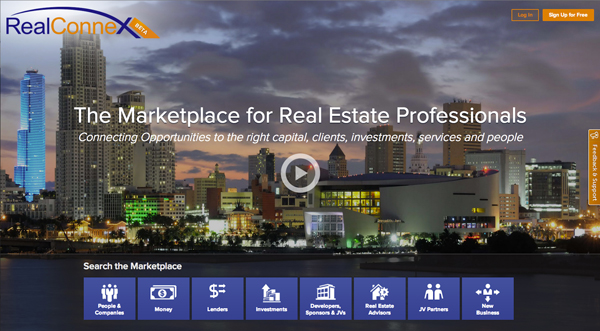Resistance to change in the real estate industry is fading away as new technologies become ingrained in the day-to-day business of buying, selling and developing properties. The creators and backers of new real estate tech say they hope to change things in the same way that disruptive new services have revolutionized other aspects of modern life, such as Amazon changing the way we shop and Uber changing the way we get around.
Unicorns like WeWork and Compass have made their mark — the former has earned billions in investments and the latter hundreds of millions — with tech-heavy offerings, but there’s also an ecosystem of startups exploring the next steps on a smaller scale.
Adoption of new technologies is “beginning to be a seismic shift,” said Roy Abrams, the CEO and founder of RealConnex, a firm that develops AI-powered networking software. With 25 years in the real estate tech space, Abrams has seen the progression from resistance to acceptance from even the most old-school colleagues. “In the beginning it’s possible, then it’s probable and now it’s inevitable,” he said.
The Miami area is home to its fair share of entrepreneurs and is looking for more. “I think there’s an aspiration and a desire to be a major player in innovation in South Florida,” said Tony Cho, CEO of development and brokerage firm Metro 1. Cho is also a founding partner in the $1 billion Magic City Innovation District planned for Little Haiti. The 17-acre mixed-use development will include a 15,000-square-foot innovation center to house startups and a coworking space.
Cross-pollination is already happening within the real estate tech community. Metro 1 has partnered with Miami Beach-based JM Studios to develop augmented-reality applications for visualizing real estate and helped ReThink, an Austin-based firm, roll out its CRM software to a national audience.
“We get requests from technology companies all the time for us to join their betas because they know we’re an integrated real estate company and not a more traditional company,” said Martin Bravo, Metro 1’s marketing and research manager.

AI-powered platforms
RealConnex, which was founded in Miami in 2013, aims to eliminate another pain point in the industry: the difficulty of finding the right opportunities at the right time. The artificial intelligence-backed platform connects professionals from across the industry, including brokers, developers, investors, designers and engineers.
With “well in excess of 700,000” entries on the platform, Roy Abrams, RealConnex’s founder and CEO, says the company’s computing power can mine all that data to determine trends, in addition to presenting personalized information for each user.
“When people come on the platform and say who they are and what they’re doing given their unique experiences, the way every single person lands on the platform will be unique to them depending on what’s important to them,” Abrams said. “We’ve had to devise our own AI architecture around that.”
In February, RealConnex won the “Commercial Product of the Year” award from the Miami Association of Realtors. It’s a recognition, Abrams said, that shows how willing the real estate community is to adopt new technologies.
After raising $3.5 million in funding in March 2017, RealConnex is ready to launch an app store for real estate technology vendors in June; it will give users the chance to find the latest services and platforms to help their businesses.
“We’re aiming to be the LinkedIn meets Amazon meets Match for professional real estate,” Abrams said.
 Unlocking Blockchain’s potential
Unlocking Blockchain’s potential
One innovation that could fundamentally change property deals is blockchain, the technology behind cryptocurrencies like Bitcoin. By creating encrypted electronic records that are stored across computers, blockchain offers the potential to limit fraud and errors by increasing transparency. Deeds and contracts stored on blockchain create an irreversible record of every transaction, which is updated in near real time.
A Deloitte report on the potential impact of blockchain on commercial real estate identified multiple areas in property sales and leasing that could be improved by using the technology, including making property searches better by eliminating fragmented listing data, pre-contract due diligence and the use of smart contracts. In fact, Deloitte theorized that there were few points of the process that would not benefit from an eventual widespread adoption of blockchain technology.
“Blockchain right now is what the World Wide Web was in the early ’90s,” said Keller Williams Realty broker Javier Perez-Karam.
RealConnex’s Abrams, who gave his first talk on blockchain two years ago to an audience that had never heard of it, has seen an entire industry grow around the technology since.
“Things like blockchain become inevitable, specifically when relating to transactions,” Abrams said. “I mean, it doubles down on my assurance of title, why wouldn’t I use it?”
Despite the potential, however, the industry is still waiting to see how the processes evolve and, perhaps more importantly, what action, if any, regulators
will take.

Jason Doyle, Gridics
Easing the pain in planning
One Miami startup that is expanding beyond South Florida is Gridics, which has created software to visualize real estate data and streamline the plan approval process. The firm’s Zonar.City platform can be used by architects, developers and municipalities to check site-specific plans against zoning codes.
The company partnered with the city of Miami last year to ease the time and workload of reviewing development plans.
“For the type of reviews they used Zonar for, there was anywhere between a 50 and 70 percent reduction in the amount of time, depending on the complexity of the review,” Gridics CEO Jason Doyle said. “It was taking them about 12 hours to do this type of development review, and we reduced that to four to six.”
In November, Gridics raised $1.6 million in a seed funding round led by South Florida developers BH3. “It really provides an avenue to exponential growth through efficiency and data capture, and that was intriguing to us,” said BH3 co-founder Daniel Lebensohn, “which is why we led the last round and why we’ll be leading the next round.”
The firm signed new city partnerships with Fort Lauderdale in February and Delray Beach in January, but Doyle said the expansion is nationwide. His colleagues recently finished loading the New York City zoning code into the platform, and he expects to announce a new municipal partnership in California in the coming weeks.
